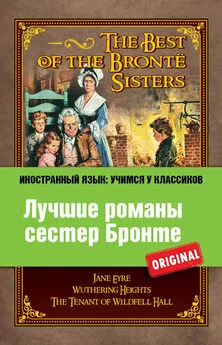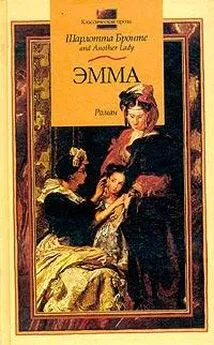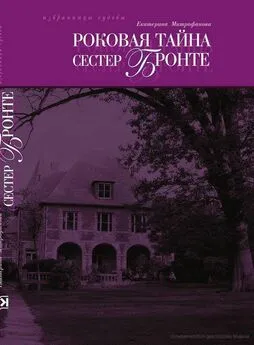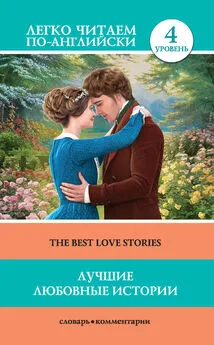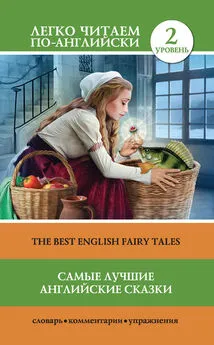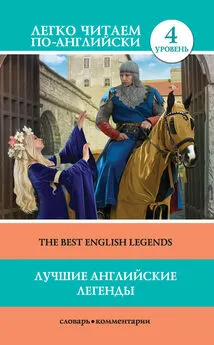Шарлотта Бронте - Лучшие романы сестер Бронте / The best of the Brontë sisters
- Название:Лучшие романы сестер Бронте / The best of the Brontë sisters
- Автор:
- Жанр:
- Издательство:Литагент «Эксмо»334eb225-f845-102a-9d2a-1f07c3bd69d8
- Год:2013
- Город:Москва
- ISBN:978-5-699-61892-7
- Рейтинг:
- Избранное:Добавить в избранное
-
Отзывы:
-
Ваша оценка:
Шарлотта Бронте - Лучшие романы сестер Бронте / The best of the Brontë sisters краткое содержание
«Иностранный язык: учимся у классиков» – это только оригинальные тексты лучших произведений мировой литературы. Эти книги станут эффективным и увлекательным пособием для изучающих иностранный язык на хорошем «продолжающем» и «продвинутом» уровне. Они помогут эффективно расширить словарный запас, подскажут, где и как правильно употреблять устойчивые выражения и грамматические конструкции, просто подарят радость от чтения. В конце книги дана краткая информация о культуроведческих, страноведческих, исторических и географических реалиях описываемого периода, которая поможет лучше ориентироваться в тексте произведения.
Серия «Иностранный язык: учимся у классиков» адресована широкому кругу читателей, хорошо владеющих английским языком и стремящихся к его совершенствованию.
Лучшие романы сестер Бронте / The best of the Brontë sisters - читать онлайн бесплатно ознакомительный отрывок
Интервал:
Закладка:
‘Then, sir, I fear you must be very much worse than you should be, if I, a mere ordinary mortal, am, by your own confession, so vastly your superior; and since there exists so little sympathy between us, I think we had better each look out for some more congenial companion.’ And forthwith moving to the window, I began to look out for my little son and his gay young friend.
‘No, I am the ordinary mortal, I maintain,’ replied Mr. Hargrave. ‘I will not allow myself to be worse than my fellows; but you, Madam – I equally maintain there is nobody like you. But are you happy?’ he asked in a serious tone.
‘As happy as some others, I suppose.’
‘Are you as happy as you desire to be?’
‘No one is so blest as that comes to on this side eternity.’
‘One thing I know,’ returned he, with a deep sad sigh; ‘you are immeasurably happier than I am.’
‘I am very sorry for you, then,’ I could not help replying.
‘Are you, indeed? No, for if you were you would be glad to relieve me.’
‘And so I should if I could do so without injuring myself or any other.’
‘And can you suppose that I should wish you to injure yourself? No: on the contrary, it is your own happiness I long for more than mine. You are miserable now, Mrs. Huntingdon,’ continued he, looking me boldly in the face. ‘You do not complain, but I see – and feel – and know that you are miserable – and must remain so as long as you keep those walls of impenetrable ice about your still warm and palpitating heart; and I am miserable, too. Deign to smile on me and I am happy: trust me, and you shall be happy also, for if you are a woman I can make you so – and I will do it in spite of yourself!’ he muttered between his teeth; ‘and as for others, the question is between ourselves alone: you cannot injure your husband, you know, and no one else has any concern in the matter.’
‘I have a son, Mr. Hargrave, and you have a mother,’ said I, retiring from the window, whither he had followed me.
‘They need not know,’ he began; but before anything more could be said on either side, Esther and Arthur re-entered the room. The former glanced at Walter’s flushed, excited countenance, and then at mine – a little flushed and excited too, I daresay, though from far different causes. She must have thought we had been quarrelling desperately, and was evidently perplexed and disturbed at the circumstance; but she was too polite or too much afraid of her brother’s anger to refer to it. She seated herself on the sofa, and putting back her bright, golden ringlets, that were scattered in wild profusion over her face, she immediately began to talk about the garden and her little playfellow, and continued to chatter away in her usual strain till her brother summoned her to depart.
‘If I have spoken too warmly, forgive me,’ he murmured on taking his leave, ‘or I shall never forgive myself.’ Esther smiled and glanced at me: I merely bowed, and her countenance fell. She thought it a poor return for Walter’s generous concession, and was disappointed in her friend. Poor child, she little knows the world she lives in!
Mr. Hargrave had not an opportunity of meeting me again in private for several weeks after this; but when he did meet me there was less of pride and more of touching melancholy in his manner than before. Oh, how he annoyed me! I was obliged at last almost entirely to remit my visits to the Grove, at the expense of deeply offending Mrs. Hargrave and seriously afflicting poor Esther, who really values my society for want of better, and who ought not to suffer for the fault of her brother. But that indefatigable foe was not yet vanquished: he seemed to be always on the watch. I frequently saw him riding lingeringly past the premises, looking searchingly round him as he went – or, if I did not, Rachel did. That sharp-sighted woman soon guessed how matters stood between us, and descrying the enemy’s movements from her elevation at the nursery-window, she would give me a quiet intimation if she saw me preparing for a walk when she had reason to believe he was about, or to think it likely that he would meet or overtake me in the way I meant to traverse. I would then defer my ramble, or confine myself for that day to the park and gardens, or, if the proposed excursion was a matter of importance, such as a visit to the sick or afflicted, I would take Rachel with me, and then I was never molested.
But one mild, sunshiny day, early in November, I had ventured forth alone to visit the village school and a few of the poor tenants, and on my return I was alarmed at the clatter of a horse’s feet behind me, approaching at a rapid, steady trot. There was no stile or gap at hand by which I could escape into the fields, so I walked quietly on, saying to myself, ‘It may not be he after all; and if it is, and if he do annoy me, it shall be for the last time, I am determined, if there be power in words and looks against cool impudence and mawkish sentimentality so inexhaustible as his.’
The horse soon overtook me, and was reined up close beside me. It was Mr. Hargrave. He greeted me with a smile intended to be soft and melancholy, but his triumphant satisfaction at having caught me at last so shone through that it was quite a failure. After briefly answering his salutation and inquiring after the ladies at the Grove, I turned away and walked on; but he followed and kept his horse at my side: it was evident he intended to be my companion all the way.
‘Well! I don’t much care. If you want another rebuff, take it – and welcome,’ was my inward remark. ‘Now, sir, what next?’
This question, though unspoken, was not long unanswered; after a few passing observations upon indifferent subjects, he began in solemn tones the following appeal to my humanity: –
‘It will be four years next April since I first saw you, Mrs. Huntingdon – you may have forgotten the circumstance, but I never can. I admired you then most deeply, but I dared not love you. In the following autumn I saw so much of your perfections that I could not fail to love you, though I dared not show it. For upwards of three years I have endured a perfect martyrdom. From the anguish of suppressed emotions, intense and fruitless longings, silent sorrow, crushed hopes, and trampled affections, I have suffered more than I can tell, or you imagine – and you were the cause of it, and not altogether the innocent cause. My youth is wasting away; my prospects are darkened; my life is a desolate blank; I have no rest day or night: I am become a burden to myself and others, and you might save me by a word – a glance, and will not do it – is this right?’
‘In the first place, I don’t believe you,’ answered I; ‘in the second, if you will be such a fool, I can’t hinder it.’
‘If you affect,’ replied he, earnestly, ‘to regard as folly the best, the strongest, the most godlike impulses of our nature, I don’t believe you. I know you are not the heartless, icy being you pretend to be – you had a heart once, and gave it to your husband. When you found him utterly unworthy of the treasure, you reclaimed it; and you will not pretend that you loved that sensual, earthly-minded profligate so deeply, so devotedly, that you can never love another? I know that there are feelings in your nature that have never yet been called forth; I know, too, that in your present neglected lonely state you are and must be miserable. You have it in your power to raise two human beings from a state of actual suffering to such unspeakable beatitude as only generous, noble, self-forgetting love can give (for you can love me if you will); you may tell me that you scorn and detest me, but, since you have set me the example of plain speaking, I will answer that I do not believe you. But you will not do it! you choose rather to leave us miserable; and you coolly tell me it is the will of God that we should remain so. You may call this religion, but I call it wild fanaticism!’
‘There is another life both for you and for me,’ said I. ‘If it be the will of God that we should sow in tears now, it is only that we may reap in joy hereafter. It is His will that we should not injure others by the gratification of our own earthly passions; and you have a mother, and sisters, and friends who would be seriously injured by your disgrace; and I, too, have friends, whose peace of mind shall never be sacrificed to my enjoyment, or yours either, with my consent; and if I were alone in the world, I have still my God and my religion, and I would sooner die than disgrace my calling and break my faith with heaven to obtain a few brief years of false and fleeting happiness – happiness sure to end in misery even here – for myself or any other!’
‘There need be no disgrace, no misery or sacrifice in any quarter,’ persisted he. ‘I do not ask you to leave your home or defy the world’s opinion.’ But I need not repeat all his arguments. I refuted them to the best of my power; but that power was provokingly small, at the moment, for I was too much flurried with indignation – and even shame – that he should thus dare to address me, to retain sufficient command of thought and language to enable me adequately to contend against his powerful sophistries. Finding, however, that he could not be silenced by reason, and even covertly exulted in his seeming advantage, and ventured to deride those assertions I had not the coolness to prove, I changed my course and tried another plan.
‘Do you really love me?’ said I, seriously, pausing and looking him calmly in the face.
‘Do I love you!’ cried he.
‘Truly?’ I demanded.
His countenance brightened; he thought his triumph was at hand. He commenced a passionate protestation of the truth and fervour of his attachment, which I cut short by another question: –
‘But is it not a selfish love? Have you enough disinterested affection to enable you to sacrifice your own pleasure to mine?’
‘I would give my life to serve you.’
‘I don’t want your life; but have you enough real sympathy for my afflictions to induce you to make an effort to relieve them, at the risk of a little discomfort to yourself?’
‘Try me, and see.’
‘If you have, never mention this subject again. You cannot recur to it in any way without doubling the weight of those sufferings you so feelingly deplore. I have nothing left me but the solace of a good conscience and a hopeful trust in heaven, and you labour continually to rob me of these. If you persist, I must regard you as my deadliest foe.’
‘But hear me a moment – ’
‘No, sir! You said you would give your life to serve me; I only ask your silence on one particular point. I have spoken plainly; and what I say I mean. If you torment me in this way any more, I must conclude that your protestations are entirely false, and that you hate me in your heart as fervently as you profess to love me!’
He bit his lip, and bent his eyes upon the ground in silence for a while.
‘Then I must leave you,’ said he at length, looking steadily upon me, as if with the last hope of detecting some token of irrepressible anguish or dismay awakened by those solemn words. ‘I must leave you. I cannot live here, and be for ever silent on the all-absorbing subject of my thoughts and wishes.’
‘Formerly, I believe, you spent but little of your time at home,’ I answered; ‘it will do you no harm to absent yourself again, for a while – if that be really necessary.’
‘If that be really possible,’ he muttered; ‘and can you bid me go so coolly? Do you really wish it?’
‘Most certainly I do. If you cannot see me without tormenting me as you have lately done, I would gladly say farewell and never see you more.’
Читать дальшеИнтервал:
Закладка:
